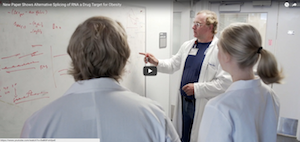 The loss of two snoRNAs, SNORD115 and SNORD116, plays a central role in the development of Prader-Willi syndrome. However, the normal function of SNORD116 is still unclear, making it difficult to understand what goes wrong when SNORD116 is lost.
The loss of two snoRNAs, SNORD115 and SNORD116, plays a central role in the development of Prader-Willi syndrome. However, the normal function of SNORD116 is still unclear, making it difficult to understand what goes wrong when SNORD116 is lost.
Dr. Stamm’s group at the University of Kentucky is exploring the complex web of how SNORD116 influences other genes.
Their preliminary studies indicate that SNORD116 regulates a number of other RNAs. In this project, titled "The molecular mechanism of SNORD116 action and possible SNORD116 substitution strategies," they will define the genes that SNORD116 targets, potentially identify new therapeutic targets, and explore approaches to rescue or replace the SNORD116 function that is missing in PWS.
For more insight into the research that Dr. Stamm's group is advancing, please visit the research blog post from October 2016, found here, featuring a video from The University of Kentucky highlighting Dr. Stamm's work and recent publication "Oligonucleotide‐induced alternative splicing of serotonin 2C receptor reduces food intake." The video describes how SNORD115, which is also missing in PWS, is normally involved in regulating proteins that help control appetite. It also shows how Dr. Stamm's group is developing oligonucleotides to mimic and restore function of SNORD115. Early results shows this mimic works to reduce appetite in mice.








